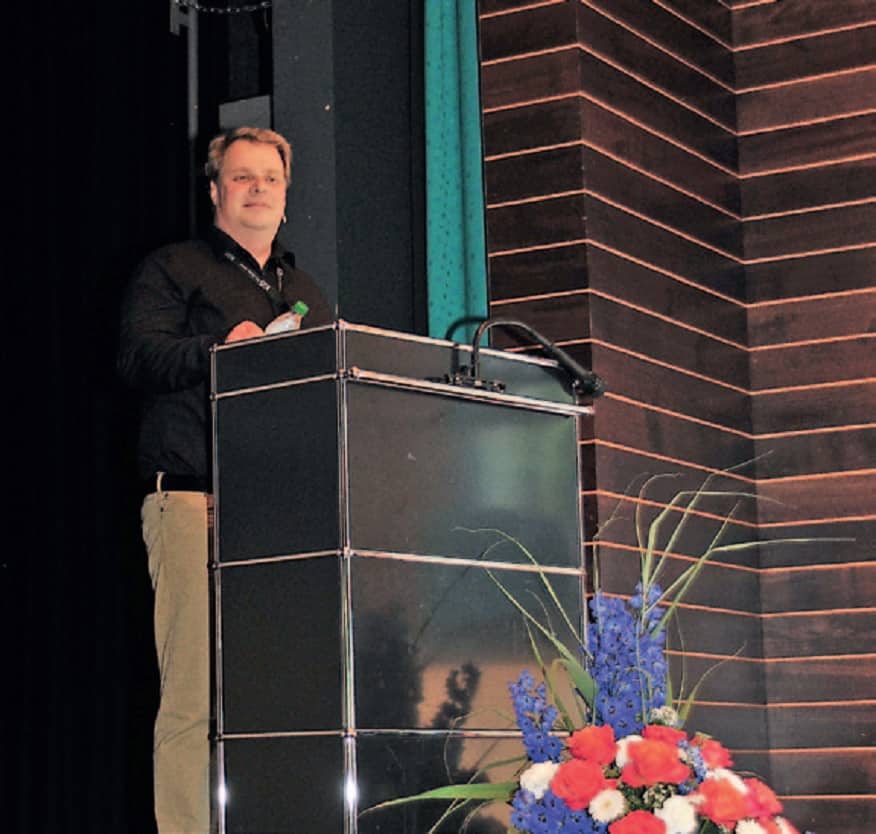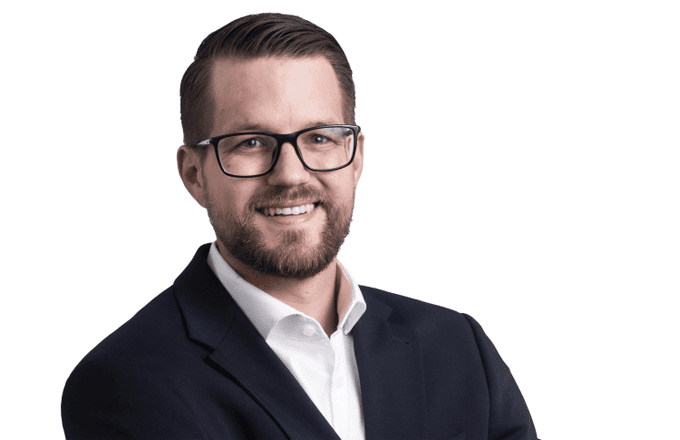The future has begun
For 20 years on the market and on the road to success, "The Quality Maker", the team of IQS AG. For the anniversary conference on 1 July, 150 invited guests came to the Stadthalle Zofingen and experienced an event full of visions for the future.

En fact, a successful company would have every reason to celebrate its 20th birthday with a proud review of what it has achieved. But once again, IQS AG in Zofingen proved that it simply "ticks" differently than ordinary companies. The Swiss market leader for quality management software solutions used its anniversary as an opportunity to confront its guests with future trends that lie beyond official perceptions.
Setting the course
Nevertheless, company founder and computer scientist Hans-Peter Kost is a realist. And he has to be, if the IQS team wants to help its customers to make their operating processes transparent, efficient and controllable with the IQSoft software. But he was and is also a visionary, in two respects: 20 years ago, computer scientists wanted to make the world happy with their ready-made solutions and created needs that did not even exist. HansPeter Kost put a thorough stop to this. Instead of "talking up" a product to the customer, the IQS computer scientists first listened carefully because they wanted to know where the customer's needs lay. And only then did they develop the appropriate tools. This was the beginning of the success story. And with the 100th IQSoft customer, the second vision followed: "When we have achieved 100, we will also achieve 1000". For this goal, the boss in the team was almost declared crazy. But this goal is also a reality today.
88 million barrel per day
"We must leave oil before it leaves us." Dr. Daniele Ganser, founder and owner of the Swiss Institute for Peace and Energy Research, made it unmistakably clear to the audience in Zofingen what the hour has come to. It is true that oil will be around for at least another 40 years. But conventional oil production reached its peak in 2006 at 70 million barrels per day. Conventional production cannot be expanded. The difference to the worldwide daily demand of 88 million barrels is filled with gas condensates, deep sea oil, tight oil, tar sands, agrofuels and recently fracking - with partly devastating consequences for people and the environment.
In his book "Europe in the Oil Rush", Daniele Ganser describes the global struggle for oil, a dramatic energy scenario that leaves no one cold. As soon as there is less and less oil every year, the distribution battles get tougher and the price goes up. In Ganser's opinion, the war in Iraq, like the war in Libya, was purely a matter of oil. The conflict in Syria is also in oil territory, with the US, Saudis and Iran also active there in the background. All this means: the battle for energy is not going to start at some point, it is going on, and at full speed.
Conventional oil has been declining in the USA for 40 years. The biggest supplier is Saudi Arabia. But its ten million barrels per day barely cover half the US's daily requirements. In terms of world politics, the battle for "liquid gold" is coming to a head, also against the backdrop of the fact that in twelve years, another billion more people will be living in the world - with demands similar to those we take for granted today.
520 weeks In view of this dramatic development and the threat of resource wars, it is high time, according to Ganser, to give the term "energy transition" a positive connotation. The vision of an energy economy that is sustainable in the long term must go beyond renewable energies and energy efficiency. In other words, energy production should be brought closer to Europe and Switzerland again. Instead of sending money into the desert, renewable energies should be expanded domestically. According to Ganser, Switzerland could develop a highly innovative export product with "cleantech" and take on a pioneering role in Europe.
520 weeks is only ten years...
The energy of the future, according to Lars Thomsen, is not fossil. Lars Thomsen, head of "future matters" based in Zurich and Munich, is one of Europe's prominent trend and futurologists. "We are entering the solar age," he is convinced. The trend is unstoppable. Solar power is becoming cheaper all the time. In order to make the world a better planet, an end to "the incredible waste of energy" is inevitable, warned Lars Thomsen, who is convinced that storing energy will be the big issue of the future.
He believes that the automotive industry will be the most affected, and that by 2016/ 2017 it will have succeeded in developing an electric car that is cheaper and much more effective than a vehicle powered by fossil fuels. While only 20 percent of internal combustion engines are used for propulsion, while 80 percent is wasted as waste heat, the effective and almost "waste-free" energy utilization of electric motors is approaching 100 percent. The beginning of the end of the fossil fuel era has therefore already begun.
The smart machines
The turn to a new energy system is one of the "tipping points" or trend breaks that, according to Lars Thomsen, will fundamentally change our lives by 2023 or in the next 520 weeks. Another is "the end of stupidity" of computers, which today still function as useful idiots. Through enormous amounts of stored data and computing power, computers are beginning to think, they are becoming "smart." Until now, the computer only executed commands, calculated. Now it begins to understand. As a result, it is now acting as a "personal digital assistant", sorting, understanding and answering e-mails itself, for example. In other words, it relieves us of work and begins to give us tips.
Machines will increasingly network via the "Internet of Things". The trend break is currently taking place. For the first time, more machines are communicating with each other than people. And this digital nervous system is becoming ever denser. In the near future, networked traffic lights, for example, will recognize traffic volumes, "talk" to each other, and regulate the optimal flow of traffic according to the situation. The next stage will be reached "when household appliances get legs and hands" and humanoid robots are able to take over routine tasks like humans, explained Lars Thomsen, pointing out that this has already been achieved in part.
Working and living differently
Thomsen madeThomsen madeDoes this mean that humans are being overtaxed by development or even replaced by the smart machine? No, the opposite is the case, said Thomsen. Today, the trend is moving in a different direction than in the days of industrialization. The machine relieves the human being, helps him, complements him. People have to reorganize themselves, move away from the previous pattern, be creative in dealing with the new InteThomsen madeThomsen machtelligence.
Thomsen made it clear: "We live in a time when everything is changing much faster than ever before. People always think of the past and talk about the great changes of the last ten years. Right now, however, there are more changes than ever before and at a rapid pace - affecting all of life." By 2023, he said, it will be a matter of defining ourselves as a "social network" and finding a new way of being together in society. Our children's generation has already embraced this epochal development, said Lars Thomsen optimistically.
For companies and their value creation systems, it is important not to miss the quantum leaps of these rapid changes. Of course, this also applies to IQS AG. A company that has been successful with intelligent software for 20 years is likely to be particularly challenged by the future described.









